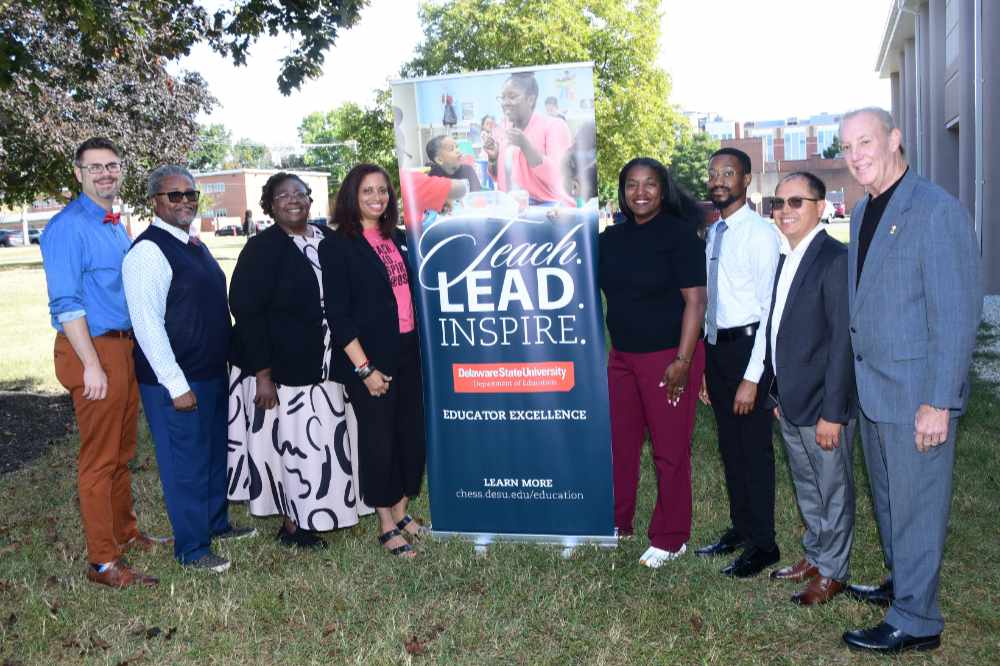
Ed.D. Program becomes member of Carnegie Doctoral Consortium
Delaware State University’s Doctor of Education (EdD) programs in Educational Leadership has recently received a prestigious endorsement by its acceptance as a member of the Carnegie Project on the Education Doctorate (CPED).
This is the highest achievement for a doctoral education program. It is also historically significant as DSU is one of only two Historically Black Colleges and Universities currently recognized as members of the CPED.
“Being part of a professional network of like-minded institutions fosters collaboration and sharing of best practices, while at the same time creating the ideal context to learn from those who have made strides in those areas where we aspire to become even greater,” said Dr. Shelley Rouser, Chair of the DSU Education Department.
Dr. Patrice Gilliam-Johnson, Interim Provost and Chief Academic Officer, said DSU’s Ed.D programs’ participation in the CPED has the potential to significantly enhance the institution’s academic offerings.
“This affiliation marks an important milestone in the evolution of our Doctor of Education program and positions us among a distinguished group of HBCUs within the CPED consortium,” Dr. Gilliam said. “It is a testament to the dedication of our faculty and scholars, who are at the forefront of preparing inclusive educational leaders for both higher education and K-12 settings. This achievement underscores our commitment to advancing professional excellence and responding to the evolving needs of the education landscape.”
DSU Education Department’s Ed.D. program was initiated in 2005 as a leadership-focused doctorate in education. Approximately 10 years later the doctoral program was segmented into the professional specializations of K-12 school leadership and higher education programs.
“We are elated to be recognized by CPED,” said Dr. Brenda G. Wynder, Associate Professor of K-12 Educational Leadership, and DSU’s primary liaison with the CPED. “This opportunity will confirm the effectiveness of practices that are already in place as well as equip us with other cutting-edge practices being used in the field. I am looking forward to launching this work in October.”
Dr. Wynder added that in the Spring 2025 semester, the DSU Ed.D. programs will begin to use the CPED resources to enhance the Ed.D. doctoral program’s specialized areas.
With this high value recognition, Delaware State University’s Ed.D. Program is now recognized as a member of the CPED consortium with consists of over 145 colleges and universities. “Participation in CPED will facilitate public recognition of a doctoral program we already know is exceptional and reinforces our commitment to equity and social justice,” said Dr. Pietro A. Sasso, Associate Professor of Higher Education.
“CPED provides us a great opportunity to engage in continuous evaluation and improvement of our Ed.D. programs, emphasizing tenets that are aligned with our DSU mission and strategic plan. Through collaboration with our CPED peers, we strive to develop scholar practitioners who can address the challenges and opportunities facing K-12 and higher education institutions,” said Dr. Tina Mitchell, Program Director of Graduate Education Programs at DSU.
DSU’s Ed.D. Program has been recognized by the CPED for its academic rigor and program excellence, as well as for the commitment of the program and its faculty to equity, ethics, and social justice. CPED was founded in 2007 at the Carnegie Foundation and supports Ed.D. programs and schools of education by providing faculty professional development that challenges them to rethink advanced educational leadership preparation through improved doctoral program development.
“I am very proud of the Ed.D. Program’s leadership and scholarly accomplishments that afforded us an opportunity to be recognized and honored by the Carnegie Project on the Education Doctorate,” said Dr. Gwendolyn Scott-Jones, Dean of the School of Graduate, Adult and Extended Studies. “Recognition of this caliber speaks to program excellence, admirable faculty scholarship and the production of educational leaders, who are highly prepared for gainful employment opportunities in K-12 and post-secondary educational settings.”

